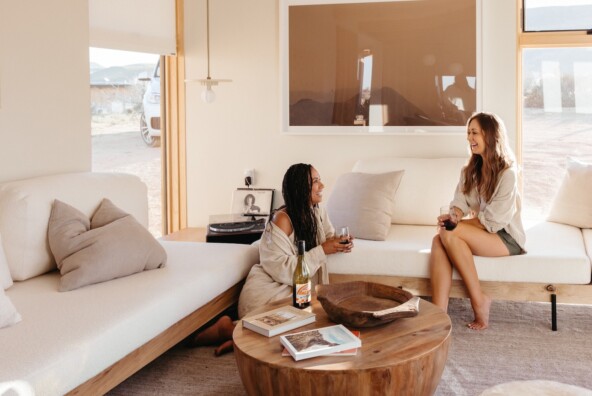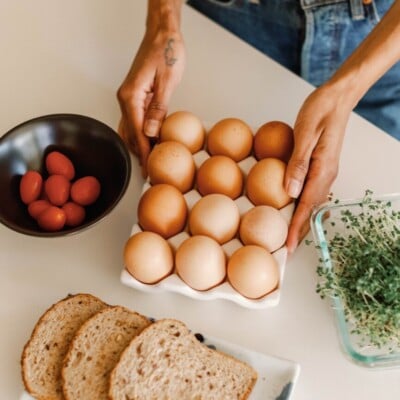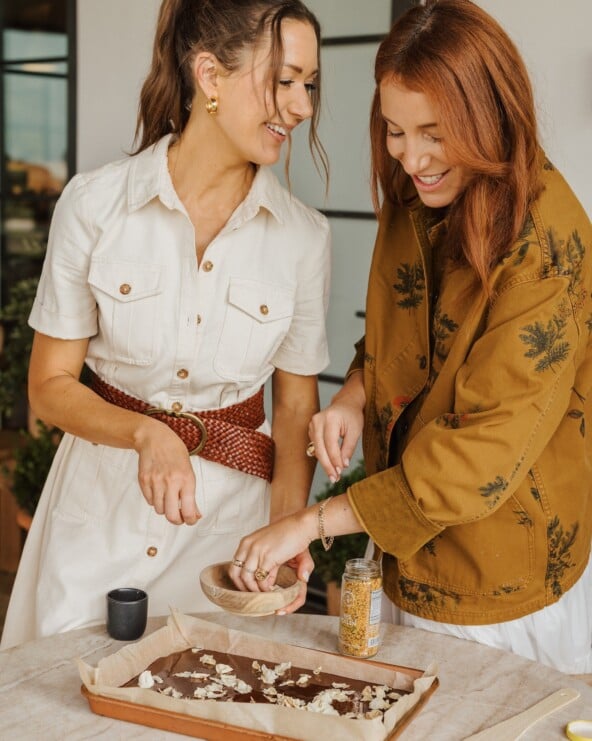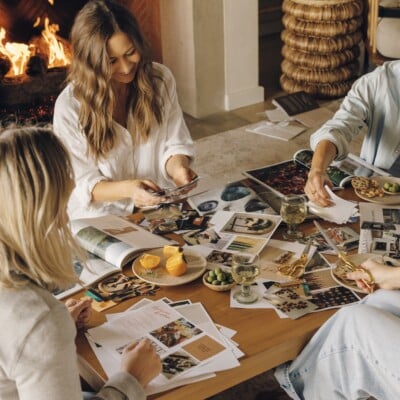Back in August we sat down with former political advisor Naomi Wolf to talk about what we should be doing during a non-election year, and her insights were truly eye-opening. Naomi’s formidable resume extends beyond just politics — she’s also a New York Times best-selling author. Her 1990 book, The Beauty Myth, is considered a new feminist classic. As a journalist, she’s bravely addressed issues like abortion, ISIS, Edward Snowden, and the Occupy Wallstreet Movement. These days she’s paving the way for civic action on the internet with her website Daily Clout. As an all female team of journalists ourselves, we were more than excited to sit down with Naomi and talk about what it means to be a feminist in 2017. According to her, the internet is actually one of the best places we can be doing good work for women’s rights. Scroll down to discover Naomi’s insights on modern day feminism and how we can help each other as women. Ladies, it’s time to tighten our ponytails and get things done!

First, let’s talk about the term “feminist.” What does that word mean to you in 2017, and how has it changed?
Naomi: That’s such a great question. Well, it’s really exciting for me to watch your generation because there have been several generations where no one wanted to call themselves (or himself) a “feminist.” It was such a marginalized word. You guys have really reclaimed it and made it your own. Which I always knew was what had to happen. Your feminism isn’t my mother’s feminism or mine, and that’s as it should be. That means it’s a healthy growing movement. So what does it mean? I mean, the best thing about what feminism means in 2017 is that it means so many different things to so many different people. There are people… I don’t need to enumerate it. There are vegan feminists. There are pro-life feminists, and there are military feminists. There are small business feminists. There are people who reject the word “feminism” because of its association with white female privilege, but are doing pro-woman things, which could be identified with feminism, without the label. There are good male feminists and this multiplicity is such a good thing.
In the 70s and 80s and even 90s, there was so much rigidity and ideological political correctness about who could be a feminist, and what that had to look like. It couldn’t include men, it was so puritanical. You guys have really broken through that. So I guess that the summary of what I’m saying is it can mean whatever you want it to mean. That’s as it should be, because feminism should, in my view, mean every woman’s right to live her life that she sees fit. Also every man’s right to support that freedom for women.
That’s a beautiful definition. Thank you.
Given that premise, this may be a difficult question to answer. But what do you think are the major issues facing feminism today?
Naomi: That really depends on where you live. You know, we’re able to talk about luxuries like mobilizing online because we live in a developed, affluent country. If you’re in a lot of Asia or Africa or the global South, your issues are going to be not being married off at 12. Or not dying in childbirth because you’re miles away from medical care. Or not being trafficked in Thailand. Or not being trafficked in central Europe. I mean, so many different awful issues around the world that are much, much more difficult than the ones we face in the developed North America. So I would say in North America and Europe, the biggest issue … we have all our rights legally, and we face economic justice probably.
Right.
Naomi: Because still women are disproportionately poor in America and getting poorer. More and more in America, the basic infrastructure that let even low income people get their kids educated and fed has fallen apart. So I would say poverty, even in America, is number one. The feminization of poverty, and in the global South, basic access to legal rights.

So focusing for a moment on just the United States, how can we stay informed, as women, about legislature that directly affects our bodies and our rights?
Naomi: Well, we created Daily Clout to do exactly that. I mean if you tell us, we can do it for you. If you tell us to create a weekly or monthly newsletter or RSS feed about specifically bills about abortion or bills about breast cancer, or bills about sexual assault or sexual harassment, we can do it. You can get alerts on your phone, and you can follow those bills and you can tweet the bill’s sponsor, tweet the reps when you don’t like it. That’s in public.
Just to give you a sense of how powerful that makes young women, we had one of our writers, our associate editor, Haley Snyder — she was 19 at the time — she found a bill, a really good one, that we should all know about. It addressed taxes on tampons and was introduced by an assembly woman in a low income area in California. It was such a good bill. Obviously taxes on tampons are expensive, they’re ridiculous. Men don’t have to buy them. It’s kind of a disproportionate expense, excuse me.
So Haley wrote a piece about it for The Huffington Post and embedded the Bill Cam of the actual bill. This obscure assembly woman got so much positive press and sharing online that there were 16 copycat bills in 16 other states and one in the European Union. Because other legislators saw how great the response was and how much positive kudos she was getting. Flipping it around, young Haley Snyder found a bill that had a clause in it that would defund Planned Parenthood, and it was buried in there. It was titled something totally different, like about “secret colleges.” She outed, she shone a light on it. That legislator was totally irate, and he was tweeting “Young Haley Snyder, the 19 year old…”.
Like, no. He couldn’t hide in darkness anymore. He couldn’t pass that bill.
Wow. That’s really exciting and inspiring.
The blogosphere has been a very empowering space for women of our generation where we can express ourselves freely on the topics we’re passionate about. Whether that’s business, motherhood, politics or DIY Halloween costumes. How can we use our platforms to make the world a better place for women?
Naomi: Number one, as a writer, I would just say keep telling the truth. I mean, anyone who studies the history of feminism knows that in the late 60s, early 70s, consciousness raising groups were hugely empowering and transformational for women. Just middle class white women, but that’s where one aspect of the women’s movement caught fire. Not the whole women’s movement. But for those women, consciousness raising groups led them to hear other women tell truth that no one was allowed to talk about. Like abortion, or frustration in their role as wives and mothers and housewives, or their resentment at the glass ceiling. Or the pink collar ghetto, and so many issues. They came out because women had a space to tell truth in these groups. So we’re not done telling the truth. We’ve kind of only just begun in a way telling the truth about so many things.
I think sexual assault is kind of number one. I’ve been talking a lot about sexual assault being more like going to war and surviving than having a bad sexual experience and surviving. In terms of trauma.
There are so many things that young women, especially, are telling the truth about like crazy in the blogosphere. I think the amazing thing — and I’m not the first to say this, Gloria Steinem actually said it — it used to be that if you were a 15 year old lesbian in a rural community in Oklahoma, you literally were alone. You thought you were alone. Whereas that girl can now find her community online and tell her truth and not feel alone. So yeah, I mean it’s not trivial. People tend to dismiss what women do. To me, the fact that all these young women are just speaking up online and there are all these feminist websites. Or even websites that are not explicitly feminist that cover feminist issues. Like lifestyle and wellness sites like yours that are covering feminist issues. That’s huge, it normalizes feminism.
So starting with telling the truth, then create networks for action. I would encourage women to bring that action to their real life. Whether it’s a potluck for raising money for a cause they care about, or to document sexual assault and give support to a survivor, or whatever it is. Bring that online activism into real communities.
Yes. That’s exactly what we want to do.

Your book The Beauty Myth addresses how images of beauty are used against women. Since it was first published in 1990, do you think things have gotten better or worse for us?
Naomi: In many ways, they actually have gotten better. Isn’t that nice? It’s like, women never are allowed to notice when they’ve changed history. But they really have changed history about representation in the last 28 or 30 years that I’ve been yakking about it. I mean, I left my house this morning and Ashley Graham, the very voluptuous model, was on the cover of New York Magazine. When I wrote The Beauty Myth, you would never have seen a woman of that shape or size positively represented. That’s just one example. The images we see certainly in fashion and style, they’ve got a long way to go. They’re more homogenous than they should be, but they’re more diverse than they used to be. In terms of ethnicity, in terms of body shape, in terms of even ability or disability. So that’s good, and age even. That’s good.
But there are pressures on young women that didn’t used to be there now. I think that statistics for anorexia and bulimia are exactly the same. Unfortunately, they haven’t budged. There’s more awareness of those illnesses and there’s more cultural critique of them.
In so many ways, the ideas presented in The Beauty Myth were prophetic. I mean, with the evolution of Instagram culture and the intense pressure, as you mentioned, that young women are faced with today to look perfect. I think the really interesting thing that’s happened though is that it feels like we’re doing it to ourselves. There’s like a real competition aspect and we’re just thinking as women who are active on social media and in the blogosphere, how can we liberate ourselves and our community from this trap? Is it all still about the “male gaze?”
Naomi: Yeah, yeah. That’s definitely a tough one. I mean, I’ve heard through the years women say, “We did it to ourselves.” So I think the male gaze is always… there’s nothing new about that being internalized. You know — I mean, I really hope this isn’t taken out of context — but there’s some feminist nonsense in the 80s and the 90s about the male gaze. In the sense that we are embodied creatures. We do live in relationship to people that we want to attract and be close to.
Absolutely.
Naomi: Fall in love with and be intimate with. So there was the feminist critique of the male gaze in the 80s and 90s, it condemned the body or condemned women’s interest in the body or in fashion or in pleasure. That’s a dead end. We’re designed… like, seduction is in our evolutionary makeup. Male and female. We’re designed to attract mates. That’s something that’s part of what drives us, like food and shelter.
So you’re not going to get rid of it. It’s kind of unhealthy to want to get rid of it. What you do want to do is create an atmosphere of happiness and liberation and choice and self love around this issue. I always look to the gay liberation movement as my model. Because I grew up in San Francisco in the 70s, and all around me gay men especially were claiming their right to seduce and display and wear fabulous clothes or be naked. Just claiming their sexuality and self representation. It was very, very, very, very empowering. I mean, I’m not saying there isn’t a gay male beauty myth. There is, lots of gay men have talked to me about it. I think a couple of things. If women work on self love, self validation, and especially fighting sexual assault, which happens to a third of us by the time we’re 21. It’s so traumatic and so messes up our sense of safety and is sexuality safe and self representation.
I think that goes a long way to feel safe in the environment in which you live — on Instagram or not on Instagram. The more social equality there is between men and women, the more safe and comfortable self display will be I guess, for both genders. Finally I think there has to be a movement to turn devices off sometimes. Like to break, they are addictive.
Yes. That’s something we’re talking about more and more here at Camille Styles.
Naomi: And social media is designed to be addictive, and it activates the same neural circuitry as cocaine. So I really want to create an app that over rides anyone’s ability to stop it. That switches off your stuff at a certain time of day. For a couple of days a week so that people aren’t offended when they can’t reach you. They just can’t reach you. There’s nothing you can do about it. You don’t know that they’re trying to reach you. You’re not feeling guilty.
Because I do think we have to kind of clear our minds of this stuff periodically and kind of meditate and be with nature and not be so enslaved.
We’ll be the first to download that app, Naomi. Seriously. This has just been such a thrill for us to speak with you and your ideas are so exciting. Thanks for inspiring us to keep thinking about ways we can make the world a better place for women.




